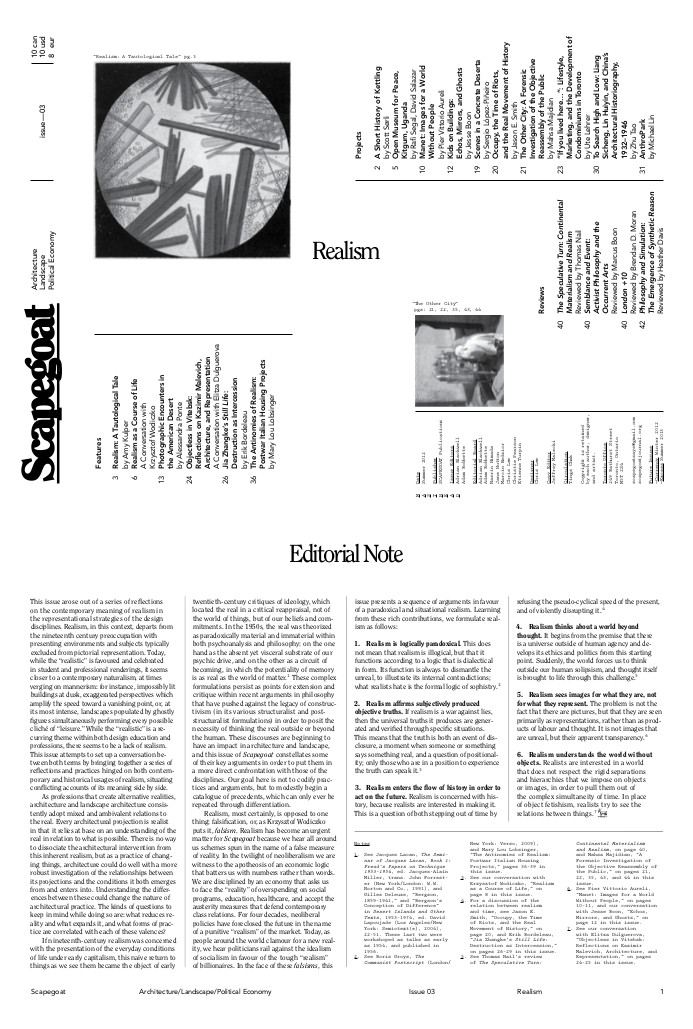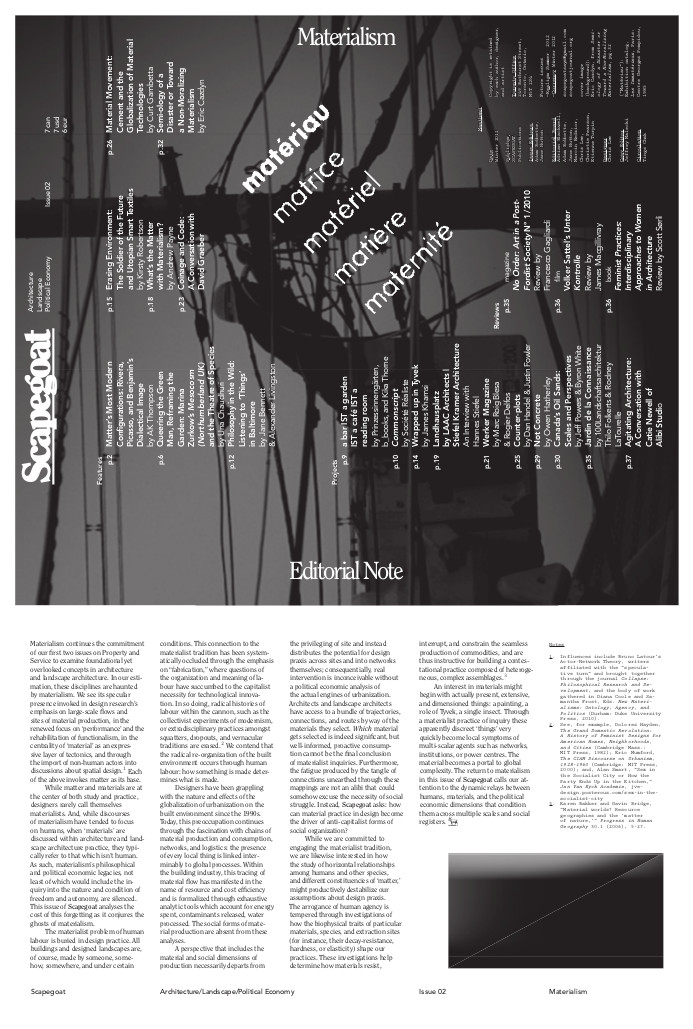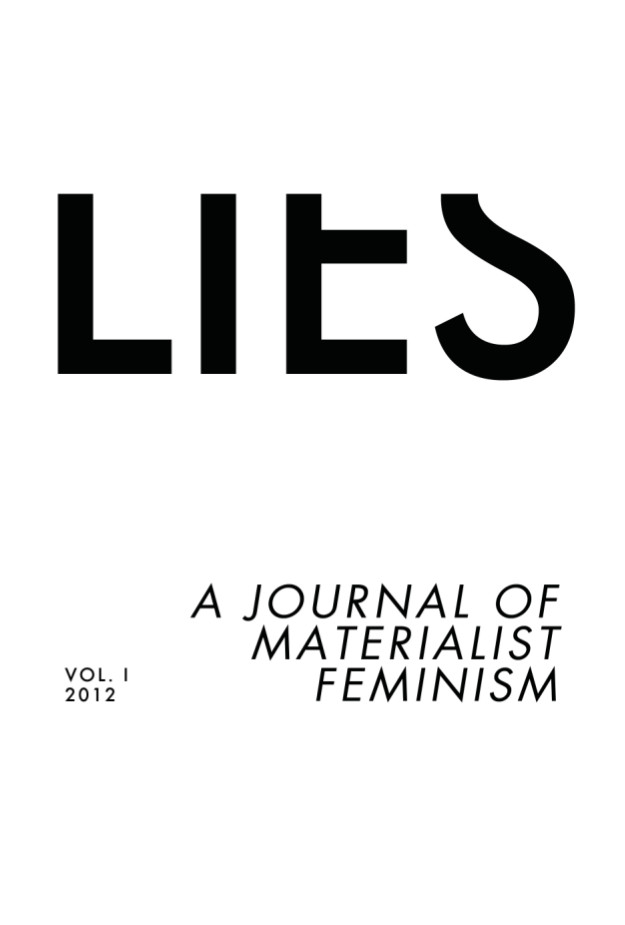Scapegoat: Architecture/Landscape/Political Economy journal, No. 2: Materialism, No. 3: Realism (2011-2012)
Filed under journal | Tags: · architecture, capitalism, city, design, landscape, materialism, philosophy, political economy, politics, urbanism

“This issue arose out of a series of reflections on the contemporary meaning of realism in the representational strategies of the design disciplines. Realism, in this context, departs from the nineteenth century preoccupation with presenting environments and subjects typically excluded from pictorial representation. Today, while the ‘realistic’ is favoured and celebrated in student and professional renderings, it seems closer to a contemporary naturalism, at times verging on mannerism: for instance, impossibly lit buildings at dusk, exaggerated perspectives which amplify the speed toward a vanishing point, or, at its most intense, landscapes populated by ghostly figures simultaneously performing every possible cliché of ‘leisure’. While the ‘realistic’ is a recurring theme within both design education and professions, there seems to be a lack of realism. This issue attempts to set up a conversation between both terms by bringing together a series of reflections and practices hinged on both contemporary and historical usages of realism, situating conflictng accounts of its meaning side by side.” (from the Editorial Note)
Issue 3: Realism
Summer 2012
Issue Editors: Adrian Blackwell, Adam Bobbette
42 pages

“Materialism continues the commitment of our first two issues on Property and Service to examine foundational yet overlooked concepts in architecture and landscape architecture. In our estimation, these disciplines are haunted by materialism. We see its specular presence invoked in design research’s emphasis on large-scale flows and sites of material production, in the renewed focus on ‘performance’ and the rehabilitation of functionalism, in the centrality of ‘material’ as an expressive layer of tectonics, and through the import of non-human actors into discussions about spatial design. Each of the above invokes matter as its base.” (from the Editorial Note)
Issue 2: Materialism
Winter 2011
Issue Editors: Adam Bobbette, Jane Hutton
Publisher Scapegoat Publications, Toronto
40 pages
Ian James: The New French Philosophy (2012)
Filed under book | Tags: · materialism, non-philosophy, ontology, phenomenology, philosophy, subjectivity, technics

This book gives a critical assessment of key developments in contemporary French philosophy, highlighting the diverse ways in which recent French thought has moved beyond the philosophical positions and arguments which have been widely associated with the terms ‘post-structuralism’ and ‘postmodernism’. These developments are assessed through a close comparative reading of the work of seven contemporary thinkers: Jean-Luc Marion, Jean-Luc Nancy, Bernard Stiegler, Catherine Malabou, Jacques Rancière, Alain Badiou and François Laruelle.
The book situates the writing of each philosopher in relation to earlier traditions of French thought. In differing ways, these philosophers decisively distance themselves from the linguistic paradigm which dominated so much twentieth-century thought in order to rethink philosophical conceptions of materiality, worldliness, shared embodied existence and human agency or subjectivity. They thereby open the way for a radical renewal of the claims, possibilities and transformative power of philosophical thinking itself.
This book will be an indispensable text for students of philosophy and for anyone interested in current developments in philosophy and social thought.
Publisher Polity, April 2012
ISBN 0745648053, 9780745648057
220 pages
review (Marjorie Gracieuse, review31)
review (Shelly Walia, Spectrum)
Lies: A Journal of Materialist Feminism, No. 1 (2012)
Filed under journal | Tags: · communism, feminism, marxism, materialism, politics, queer theory, sex, theory, women

“LIES is a new journal spearheaded by a feminist collective based in Oakland, Baltimore, Los Angeles and New York City.
LIES is a communist journal against communists.
LIES is a platform for certain conversations and critiques that are difficult, impossible or dangerous if cis men are in the room.
LIES attacks the legacy of racism and transphobia that has plagued feminist organizing and strives to develop new ways of making autonomous feminist practices today that take pointed and militant attacks on white supremacy and transphobia as essential parts of feminist struggle.
LIES came out of our experience within struggles. It seeks to embody and develop in print the practice of autonomy that we needed to save ourselves in the midst of movements squared on patriarchy and fueled by the subordination of everyone but white cis men.
LIES draws its purpose and support from networks and circles of feminist, queer, and trans people, our friends and comrades to whom this journal is devoted.”
Creative Commons Attribution-Noncommercial License
250 pages

